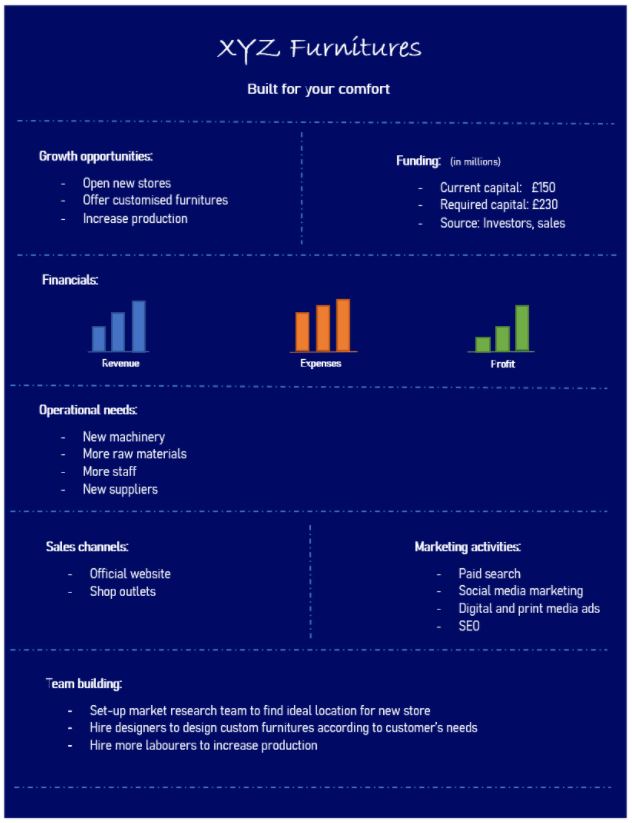
StudySmarter: Study help & AI tools
4.5 • +22k Ratings
More than 22 Million Downloads
Free
Business development is the activities, ideas, or initiatives that a company takes to improve its business over time. It aims at creating long-lasting value for the company from its markets, customers, and other relationships. Business development initiatives may be taken to increase revenue, sales, profit, or form strategic partnerships. A business development, when successfully implemented, affects all the business departments of a company such as marketing, finance, sales, production, product development, and so on. Let's examine business development in further detail.



Lerne mit deinen Freunden und bleibe auf dem richtigen Kurs mit deinen persönlichen Lernstatistiken
Jetzt kostenlos anmeldenBusiness development is the activities, ideas, or initiatives that a company takes to improve its business over time. It aims at creating long-lasting value for the company from its markets, customers, and other relationships. Business development initiatives may be taken to increase revenue, sales, profit, or form strategic partnerships. A business development, when successfully implemented, affects all the business departments of a company such as marketing, finance, sales, production, product development, and so on. Let's examine business development in further detail.
A business development strategy is a plan the business will follow to reach the business development goals.
Businesses adopt different strategies based on their goals. Business development strategies include business growth and scaling, innovation, internationalisation, or the use of digital technology.
Business development strategies may vary depending on the business goal. Each strategy benefits the company in its own way. A few of the strategies commonly adopted by companies are:
Business growth strategies focus on expanding the business as a whole through organic or inorganic growth methods to increase profits.
Growth strategies include vertical integration (forward or backwards), horizontal integration, and conglomerate integration, which focuses on making various types of strategic partnerships. (These strategies will be further explained under "Business Growth").
When a business grows, it scales in terms of economy. This is commonly known as economies of scale. Economies of scale are the decrease in production costs and the parallel increase in production volume. This production volume increases when the demand increases, and the business grows.
Benefits:
Increase in profits
Reduction in costs
More market share and assets
More attractive for financial investors
More skilled management and their expertise
Innovation strategies help to better an organisation’s existing products or services, or generate ideas for new ones.
It helps organisations to add value to their offerings and stand out in the market.
Benefits:
Helps the organisation to stay relevant in the market
Competitive advantage
Improve market position
Internationalisation is the process of adapting an organisation’s offering so that it can be consumed internationally.
This involves understanding every target market: the needs and requirements of the consumer, the legal requirements, pricing techniques, packaging, etc.
Benefits:
New markets
Foreign investment opportunities
Competitive advantage
Access to more talent
Companies adopt strategies related to digital technology when they want to improve the customer experience, add value to the business models, and simplify core business processes.
Benefits:
Improved efficiency and increased productivity
Improved customer experience
Digital security
A business development plan is a roadmap to achieve the company’s goals.
As a business developer, these are some steps that you can take to create a business development plan.
Defining the goals: define a goal that is relevant and attainable by the business. Having a specific goal is very important in knowing what step to take next. Using the SMART technique can help businesses set achievable goals for the future.
Developing profiles: the target market and potential customers should be clearly defined to generate a business strategy and marketing plan.
Understanding marketing channels: a well-established marketing plan is crucial for successful business development. The plan is dependant on the budget and the type of target group. It is important to constantly re-evaluate the established marketing plans.
Setting KPIs: KPIs or Key Performance Indicators help to analyse and quantify the business performance. You should choose KPIs wisely depending on the specific requirements of the development plan. That way, you will be able to monitor the progress.
Evaluating customer service: providing excellent customer service to both old and new clients is important for any business as it is the building block of customer loyalty. It significantly influences business growth.
Analysing resources: you can create a successful development plan only after analysing the business’ resources. A development plan that doesn't take into consideration the available resources, can not be successfully implemented.
A successful business development plan should include:
Growth opportunities: it is crucial to understand the business’ growth potential. It may be from venturing into new markets, forming strategic partnerships, product innovation, improved services, or from a combination of these.
Funding: understanding the current financial situation and analysing how much capital will be required for the completion of the process is very important. You should know how the plan will be funded.
Financial goals: set financial goals for the business based on the current numbers, and analyse how the business should grow in order to reach those goals.
Operational needs: a business development will require more supplies in terms of people, materials, machinery, etc. All the needs and requirements should be noted and met to achieve the goal.
Sales and marketing: you should set up a strong sales and marketing plan that can effectively support the growing business. This will help to promote and inform the market about the business developments.
Team building: as the business grows, it is important to build an efficient team that understands the tasks and can carry them out responsibly. The effective delegation of tasks, and hiring the right people can go a long way.
 Example Business Development Plan, StudySmarter
Example Business Development Plan, StudySmarter
Business developers require certain skills in order to successfully implement the development goals. The business’ improvements should be properly and efficiently communicated, marketed, and sold to make the plan successful.
Communication skills: when the company is undergoing an important change, the ability to listen to feedback and concerns of both customers and employees, maintain long-term relationships, and effectively convey all the necessary information to the stakeholders is fundamental.
Marketing skills: a business developer must promote and market the business’ new improvements to the right potential or existing customers. Business developers analyse the market, the target customers, and the competitors, similarly to a marketing team.
Sales skills: much like a sales team, the members of a business development project take care of updating the databases of customer relationships and sales activities, finding qualifying leads, etc.
Business development can be challenging not only because it brings about major changes within the organisation, but also because of the continuous changes taking place in the external environment. Some of the commonly faced challenges are:
Staying relevant: the market and customer demands are always changing. Therefore, an organisation should carry out continuous market research and product innovations to stay relevant in the market.
Inventory management: when the business grows, demand increases, meaning you stock more items. You are at the risk of losing customers to competitors if you fail to meet their demands. But overstocking affects the cash flow negatively. Therefore, you should have a Just-in-time inventory management to deal with the rising demands.
Growing workforce: as the company grows, it becomes necessary to increase the workforce to avoid burdening the existing employees. However, more employees mean more challenges, as many tasks, especially the administration and management tasks, become increasingly complex.
Diverse customer needs: as the company enters new markets, the customer needs and requirements vary. Therefore, you should make sure that you collect and analyse customer data continuously to meet their demands, and also maintain customer relationships.
Using the right systems: when an organisation continuously expands, it becomes difficult to maintain and track productivity and efficiency. You should be able to find the right software package for your company's needs from the many available.
Welcoming change: this can be difficult, as a change in an organisation can have a different impact on each employee. This will affect employee performance and reflect poorly on the company. You should introduce change management for employees to deal with the change and the problems they face as a consequence.
A business strategy explains how a business plans to compete in the market and achieve its objectives. Every business organisation needs to have a vision that shows what the organisation stands for and aims to achieve. A business strategy outlines the plan of action that will help a company achieve its major goals and objectives. It guides the decision-making process and helps gain a competitive advantage.
Business strategies may be set up to achieve many objectives. The most common examples of business strategies are shown below:
Grow sales from new products
Increase customer satisfaction
Produce better and more innovative products
Cross-sell more products
Product differentiation
Change pricing strategy
Sustainability
Technical advancement
Business development is the activities, ideas, or initiatives taken up by a company to better its businesses over time.
A business development strategy is a plan the business will follow in order to reach the business development goal.
Business development strategies include business growth and scaling, innovation, internationalisation, use of digital technology, etc.
A business development plan is a roadmap to achieve the company’s goals.
A business developer should possess good communication, marketing, and sales skills.
Staying relevant, inventory management, growing workforce, diverse customer needs, using the right systems, and welcoming change are a few challenges of business development.
A business strategy explains how a business plans to compete in the market and achieve its objectives.
A business development strategy is a plan the business will follow to reach the business development goals. Businesses adopt different strategies based on their goals. Business development strategies include business growth and scaling, innovation, internationalisation, or the use of digital technology.
What is global sourcing?
Global sourcing is the act of buying raw materials or product components from other foreign countries.
What are the two types of global sourcing?
Suppliers abroad may have the capacity and infrastructure to produce the material and product components at a faster rate than the company themselves.
What are the two types of global sourcing?
Two types of global sourcing are sole sourcing and multi-sourcing.
What are some incentives for global sourcing?
Low production costs, advanced technology, more efficient logistics, transportation, and infrastructure.
How do you define market entry?
Market entry is the case when the company decides to sell its products and services to a foreign market.
What is not a benefit of market entry?
Higher profit margin

Already have an account? Log in
Open in AppThe first learning app that truly has everything you need to ace your exams in one place


Sign up to highlight and take notes. It’s 100% free.
Save explanations to your personalised space and access them anytime, anywhere!
Sign up with Email Sign up with AppleBy signing up, you agree to the Terms and Conditions and the Privacy Policy of StudySmarter.
Already have an account? Log in